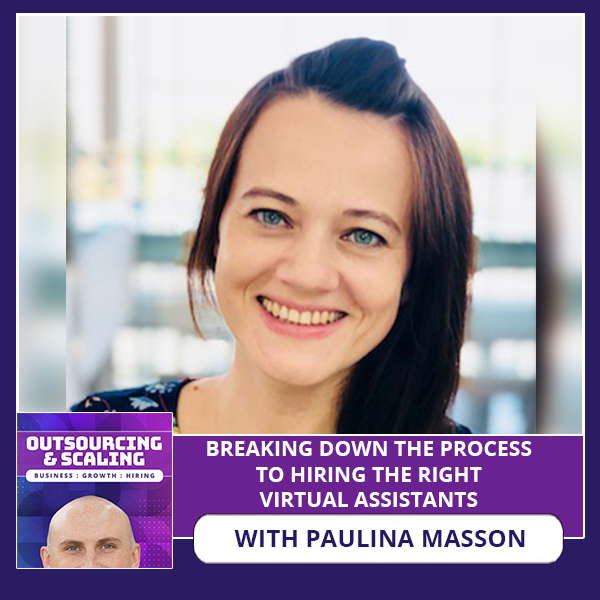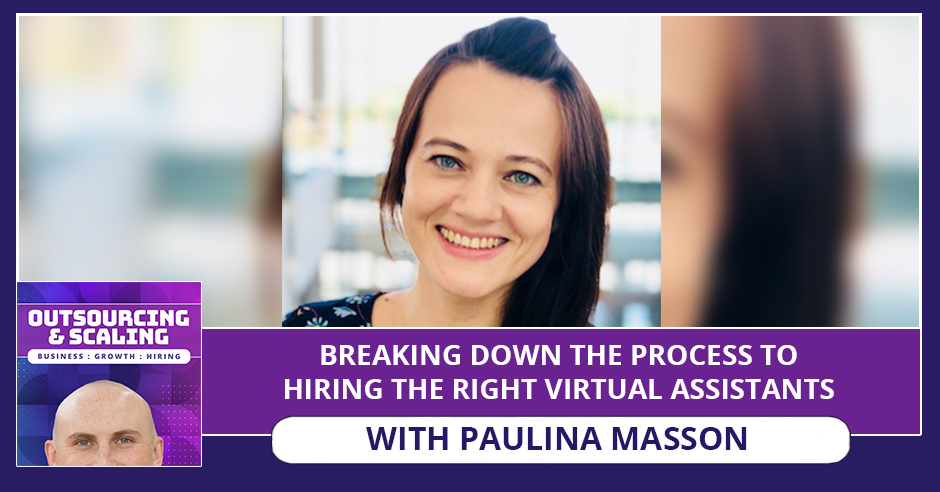


Many new entrepreneurs tend to look at the hiring process as a daunting task. As such, they tend to keep making the mistake of doing everything by themselves. Fortunately, with the technology we have now that fosters connectivity, having other people to delegate tasks to and help you grow your business has become easier. Platforms like FreeUp has since been helping many entrepreneurs find the right VAs and freelancers for them. Today’s guest, Paulina Masson, Amazon seller and Founder of Shopkeeper, is someone who has her hands on hiring the right virtual assistants. In this episode, she takes us across her hiring process, spilling what personality types are best to work with. She also shares her secrets to managing a team of freelancers for complicated work and where she sees the eCommerce is going. On top of all the great insights and advice, Paulina then gives a special treat for us, so don’t miss out.
—
Listen to the podcast here:
[smart_track_player url=”https://www.podetize.com/statsapi/www.podetize.com/wp-content/uploads/fileuploads/11-5b145ef137b51b3d1af0633e9305c43d/02/2020/6935567ede3c2aed97a043aa8c47734c.mp3″ title=”Breaking Down The Process To Hiring The Right Virtual Assistants With Paulina Masson
” artist=”Nathan Hirsch” image=”https://freeup.net/wp-content/uploads/2019/04/OAS.png” ]
Download the audio file here.
My guest is Paulina Masson. Paulina, how are you doing?
I’m good. Thank you for inviting me, Nathan.
I’m excited to have you on. For those of you that don’t know, Paulina is an Amazon seller and Founder of Shopkeeper. She calls herself a numbers girl. She’ll be talking about her hiring process for virtual assistants, how she manages a team of freelancers for complicated work and what personality types are best to work with in her opinion. She’ll also be giving out a promo at the end, so stick around for that. Paulina, we’re going to talk all about that. First, let’s take a gigantic step back. What were you like as a kid growing up? Were you a straight-A student? Were you a rebel? Did you know you wanted to be an entrepreneur?
That’s a huge step back. I was one of those ADD kids. In my days, it wasn’t officially diagnosed, but I think that’s what I had. I’ve been screaming, “Mommy, I ate seven sandwiches.” She would press on my foot and I’m like, “Why are you pressing on my foot?” I was this annoying loud kid who goes where they want. I would have this afterschool class, which I would have to attend. I would skip quietly on that. I would go to the forest and explore the things that I wanted. As a ten-year-old kid, it’s crazy. I don’t know how I survived, but that’s how I became an entrepreneur. It was always meant to be for me.
Can you talk to me about how you got into eCommerce originally? What were you doing before that? How did you come across it? What was that first year like?
I’ve been in online business and all kinds of online marketing niches. I tried SEO, paid traffic and all of these different things. Eventually, one of the niches was dying off and I was looking for opportunities, and eCommerce seemed something interesting to me. Initially, I decided the idea will be eCommerce or selling something online. I didn’t even know that Amazon was a good opportunity or not. I then came around to that through YouTube and podcasts. Step by step, I got into the idea that I should sell on Amazon. I became an Amazon seller just about when the big gold rush was in 2014 when everybody was jumping on the train. I did jump on with them. I think there are almost two million third-party sellers on Amazon. I’m one of them and I’m still a seller. They run a software business for Amazon sellers called Shopkeeper. That came about from me needing to calculate my profits correctly. Being a software developer by background, I built a tool for myself that later my brother asked to use it, my husband asked to use it, and then they shared it on a Facebook group, and then they asked to use it. Eventually, I had to hire a team and build it from scratch to be a good successful commercial product as it is now.
I’m an Amazon seller and a software owner, although it took me a while to look at FreeUp as a software company. What are the differences as a business owner between running an Amazon business and running a software company?
It’s completely different because when you are an Amazon seller, you can be a solopreneur and there’s no problem with that. You can have a lot of VAs around you. It’s still managing a team but those VAs are not so crucial when you are a small seller. You could have them or not have them. You could work more yourself if you want for fourteen hours a day. Once your business starts growing, and that applies to both Amazon sellers and having a software business, and more people are dependent on the processes, the servers, and the whole system that you are running to work properly, then it requires a stronger team. All of these big scaling issues come to place and I believe it’s much harder not exactly to run software or Amazon seller. It’s harder to run bigger businesses at scale. It’s probably when you are a small software founder, you are still dealing with big issues like a big team, at least you’re going to have two developers, even if you’re small. You’re going to have someone to manage your content on social media, someone else to run books for you. There is a team already from scratch, while Amazon seller, you can start alone for a year or two until things start going. I guess that’s the biggest difference in scale.
How do you structure your Amazon business in terms of people versus software company?
I have generalists for Amazon business, rather than in software business, I have everyone doing a specific thing. The truth is they start doing specific things, but later I feel where they are better at. For example, I hired a social media manager for writing posts and publishing on our social. I found out that she’s quick to understand technical tasks. I started giving her more technical tasks. Now, she’s a video editor. Things evolve depending on what people are good at.
Do you have team leaders? Are you on top of everyone else that you’re managing? Do you have people that are managing other people?
I don’t have people yet who manage other people because my company is not on that scale yet. In the software business, we have a team of 12 or 11. That’s including all the freelancers and the full-timers. The Amazon business, I only have two people working full-time. They are generalists who are taking care of the business from reviews to managing everything in the business, and they are VAs. One of the VAs that I got from you is the one who’s managing my Amazon business things. They’re working together with the other guy.

Let’s talk about your hiring process. What do you look for in a virtual assistant? What process do you put them through?
I’ll tell you the hard way. I know about your service and I appreciate your service for the reason that you pre-vet everyone because pre-vetting is the part that takes me the most time. Without using your services, my processes are usually like this. I go to some source online that has job applications available. I used to start from Manila Craigslist. You then go to the resume section and get a lot of potential candidates from there. You simply outreach to them or post your listing. Let’s say I’m looking for a social media manager. I would post there and started getting applications coming in. The big job is to start systemizing everything. You open a Google Sheet document and then you have each applicant in a separate row.
Make sure in your listing to say something like, “I will need you to do this, this and that. Please write up seven different ways for social media about this particular video.” Let’s pretend you’re going to post it on Twitter, Facebook, and YouTube and write it up in seven different ways. You’ll give them a task right away from the first email. When they respond, they will write up and you can immediately judge the quality of the writing and you can immediately discard them. The one column in that sheet will be whether they were good with their descriptions. If you like the descriptions, you’re going to tell them, “Please submit them all in a spreadsheet. Instead, share with me a Google spreadsheet link.” You will get all kinds of different responses. One will submit in the Google Doc and another one will share something that you opened is not even accessible yet.
You don’t even need them to be in a spreadsheet. You can just say, “Submit in a spreadsheet.” From that little request, you can quickly judge their technical aptitude, ability to follow directions and how fast they respond to that. You can now add three different columns in your spreadsheet for each row exactly how they would perform that little tasks. Once they put it there, then you already have a lot of indicators. You can send them a list of questions before you get to the video interview that you want to ask them. For example, my questions would be, how old are you? What languages are you fluent in? If that’s a social media manager, how much experience do you have as a writer?
I always ask, what is the maximum available internet speed in your area? If you hire from third world countries, usually they have problems with the internet. Even in big countries like China, good internet is hard to get by over there. It’s important to know what options they have, especially for social media managers who will need to upload a lot of video content, for example. You have this many other columns there with the answers like the Windows platform, the maximum speed is ten megabytes. From that, you can already judge whether you want to interview them. You have ten data points about each applicant already and without even talking to them yet, you can already narrow down who you want to interview.
I don’t usually do the interviews myself. I have a VA who does the interviews and records them on Zoom platform and puts a link to the recording. She uploads that video later to our Amazon server, and then she puts the link to me. I watch the interviews and I ask her to limit the interview to ten minutes so I don’t waste a lot of time watching them. In those ten minutes, she asks different questions, including personal questions to make the person feel a little bit uncomfortable. I even tried to check if they’re entrepreneurial or not.
We ask them a question like, “Did you ever plan to start your own business? If not, why not?” I want to gauge whether they are entrepreneurial or not because I don’t want them to be entrepreneurial. Usually, I want them to be someone loyal who’s going to work for me for many years. I prefer it like that. I am too entrepreneurial and I need people around me who can consistently do things that I personally am too jumpy to do. That’s how it works. That’s how the system keeps going. I watch the interviews and then I mark in the next column my comments on each. I put “Move it to the next stage.” The next stage is a personality test. That’s what I do.
Are you using DISC?
No. I send them to 16Personalities.com and they later submit exactly the URL result from that. That gives you not only like INTJ, but also the percentages for each, whether they are more extrovert or less extrovert. Even though it says E, I want to know how strong of an E they are. If they pass the video interview, I give them personality tests. Why do I need to ask for the personality test? It’s because I think that Es or the extroverts are better at sales type of jobs. The Is are better at tasks that require let’s say entering in Excel or social media managers. It’s boring. Take the same thing, upload here, and then wait for this. It’s the same thing over and over. I think Is would be happier in a job at home where an extrovert would get tired from this task. They want to get out and talk to people to get his energy back, while the introvert is strong on that.
Also, there are differences with J or P at the end, for example. These are all from the four letters in Myers-Briggs. Everybody knows these personality types. I’ve discussed that with a friend and he said he likes to hire Ps when he needs creative work and Js he hires if he wants them to be more to be able to focus on something and more mathematical and technical. The Ps are more creative and inventing new and unique approaches and ideas. Each letter has its own. You can Google what it is, but it’s helpful later. Once I am looking for a social media manager, I know that I’m definitely looking for someone who’s an introvert and who is creative. I want to see if that exists in their personality test.
If that is good, then I give them the real full test of social media manager tests. I recorded tutorials myself as I vet for the full-time contractor. I say, “Take this video, pick the best part, edit it a little bit, then write about it in ten different platforms. For Instagram, make a one-minute video. For LinkedIn, nine-minute video.” I see how they perform on that task and that’s the main test. They already passed through the funnel so far that I already expect them to be good. It’s the difference in the quality of writing, how fast they’re doing, and how technically capable they were. From that, you can pick your winners.
I usually compensate people who didn’t pass the process but spent enough time working on answers and stuff. If I hire from the Philippines, I send them $25 through PayPal to compensate for their time working on that, the good karma points. The whole process is following through. I’ve been doing that. It’s much involving, tiring and time-consuming. I liked it when I used your services that I came to you and you said, “Here’s one. I think he is the best for your job,” for my Amazon. I said, “One is not good. I want two. Give me two.” You said, “We don’t normally give two, but here’s the second one.” Both of them were awesome and I didn’t know which one to pick. I picked John and everything is going well still with him.
For anyone using FreeeUp, if you’re like, “Send me 3, send me 5,” whatever it is, we’re happy to do it. I love your process for a lot of different reasons. The biggest thing is it values your time at the highest possible level. You’re having the person go through and do all these steps, even interviewing with someone outside of you. You only get involved at the end or when you’re watching that interview that’s already been recorded that you can do anytime you want. For me, a lot of people mess up the interview process because they spend so much of their time upfront asking questions and doing that one-on-one interview before they even figure out if the person’s work can match what they need. I like the way that you prioritize that. What about after the hire? Is there a two-week trial period? Do you know quickly whether they’re a good fit or not? Talk a little bit about that.
I don’t have much experience yet with that. I’ve fired quite a few in my lifetime, but it’s hard to quickly judge whether the person is going to be the maximum potential or not. The main reason for that is I am not the manager who checks every step. Coming from other employment, if they come from a company or corporate world, they expect some manager to be there to manage them. In every step they do, “Is it good? Is it bad?” I am not there for that. I give a task and I’m looking for freelancers who are self-sufficient and enough of self-control to do the work and do the hours.
I use time trackers and apps that screenshot their work and so on. I don’t check the results or even look at those screenshots. It’s more for them to feel that they are responsible for their work. In general, it’s tough. You spend six months training someone and then they already take the load off of you. Let’s say my customer support agent. He would already take all of the load from me and then I feel like he’s not quite the right person. Now I have to go back doing it or training someone else completely. It’s hard. Sometimes you get stuck with your bad choices. That’s why the more I go, the more I realize how important it is to get a lot of applicants and not choose the first one you meet from Craigslist.
I have small-scale projects sometimes. For example, I have this project which is a two-month-long project. We are writing an article called 100 Ways To Grow Your eCommerce Business. We are interviewing about 100 different Amazon influencers and eCommerce people. To do that task, somebody has to outreach to all of them. Outreach manager has to control all of the emails she’s sent, control the answers, agree on the time, set up calendar events and all of these things. One VA is working as an outreach manager full-time on that. Once she schedules the interviews, I don’t have the time to do all of the interviews.
I only do the ones who are bigger influencers, who may need a little bit of personal approach. Most of the interviews are done by this interview host that I hired, freelancers as well. He conducts those interviews. That’s two people working on it. After the interview is done, someone has to come in and segment the video. He looks at the video and sees which pieces we are going to use in that article. It has to time check each of them. One VA is a video watcher and a checker. After that, the video editor has to edit all of them. Loose pieces are going to be put together, then the social media manager who’s going to post little bits and schedule many pieces from that to all the social media content.
After all of that, the writer has to come in and write the article. She’s a self-editor, so we don’t use it. Six different people are working on this project. For me, it takes a lot of power to coordinate and manage each individual in what they’re doing. I can’t do that and I have to trust them. It’s important to choose good people for each component because if one wheel fails, your project is going to be as good as that lowest person in the chain. The hiring process is so important. Always spend enough time and you have to be prepared for that investment of time that it requires.
Let’s talk about eCommerce. What do you see in eCommerce going forward? The biggest thing is building a brand. Before, you could get away with fake giveaways and fake reviews. What do you see that’s going to be working and not working over the next few years?
The most important thing in eCommerce is about fundamentals. People are starting to talk about the recession and what they’re going to do with their inventory stock. E-commerce, in general, is a tough business to be in because it’s such a big problem of cashflow. You have to manage cashflow. The bigger you want the business to grow, the more money you have to put in. You bought some items and then it’s selling out almost. You have to re-order. There are bigger orders, you need more money and that didn’t even sell out. You need to reorder and you keep reordering all the time. It takes so much cash. You keep borrowing or lending from Amazon and all these things. You have to manage it carefully. At the end of two years doing that, you have a lot of revenue and a lot of profit on paper, but the actual cash is tied into the inventory.
If there is a major event that changes your business around, let’s say a recession might affect you or might not. It depends on how important your product is to people. If it’s a luxury item, you may feel the recession. If it’s an everyday needed item, you may not even feel it. Something else may change. The category may get gated. You may get suspended and big competitors could come in. Many things can affect it. Imagine all of this in your front door and you are stuck with it. You have to be good to manage your risks and your egg baskets well. You think about it in advance. What if that branch fails in my business? Do I have something else to rely on?

It’s the same with my business. I am an Amazon seller but I only spend about 5% of my total time on that. I have two full-time people managing it for me. We are running it as is. I’m not putting all of my profits on it. 90% of my time goes into Shopkeeper, which is a software business. It takes a lot of my efforts and that’s what I want to grow the most. The other 5% I spend on experiments on new things that I am trying out. As soon as I see something working, I will jump in and maximize on that. I will not personally do it but put someone else in there to try and grow that branch out. That’s how I’ve always done. I try many different things and then I find something that works and I try to expand that branch and then try to scale it up.
Tell people more about Shopkeeper. Tell people where they can contact you and what you’re most excited about for the rest of the year.
Shopkeeper is awesome software. The reason I even built it is because there was nothing that shows you profit calculations from the point of view of managing by exception. When you come in and look at the many numbers, you have to be good at finding what numbers are wrong. What am I looking at? Shopkeeper is doing its best in trying to pinpoint the items that are worth looking at and are likely to do items for you. You come in and you see, “Red is over there, what’s happening? My Amazon fees increased on that item.” I have to go and check why did they increase. What’s changed? I won’t even notice if I use a seller central.
When I built it, I was using it for myself every day and it helped me to grow my business. I totally recommend using a tool like Shopkeeper, especially if you are a new seller to understand where your money is going and to manage your profit. I have a surprise for your audience. Normally when software businesses do promotions, they offer let’s say a two months free trial instead of fourteen days free trial. I have a much better deal than that. I will offer your audience six months of free trial instead of the normal fourteen days. That is useful for those new sellers who are starting up and cannot afford any software yet. You will be able to see whether your new products are doing well. You will track all of your promotions. Each coupon code and each percentage will be visible, how much promotions are costing you and how much refunds are costing you. To claim it, go to Shopkeeper.com and then at the corner, you will see a little chat bubble like all the websites have. In that chat bubble, type in the code STINGRAY180. As soon as you type it in. We’ll upgrade your account to VIP to be six months free trial for you.
Paulina, this has been awesome. Thanks for coming on.
Thanks for having me.
Important Links:
About Paulina Masson
 Paulina masson is an Amazon seller and a founder of Shopkeeper. She calls herself a ‘numbers girl’.
Paulina masson is an Amazon seller and a founder of Shopkeeper. She calls herself a ‘numbers girl’.
I will be talking about my hiring process for VA’s, how I manage the team of freelancers for a complicated project,
and what personality types are best workers in my opinion.
Promo for your audience: 6 months free trial of Shopkeeper, I will give the code during the show.
Stingray180 is the code
